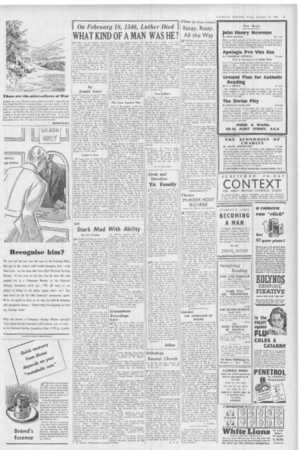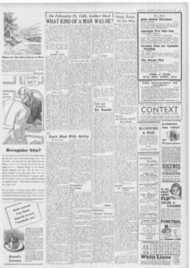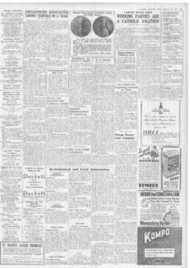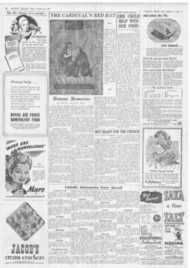Page 3, 15th February 1946
Page 3

Report an error
Noticed an error on this page?If you've noticed an error in this article please click here to report it.
Tags
Share
Related articles
A Quotation From His Books Enough To Destroy The Luther...
Luther Reading
Arnold Lunn Concludes His Estimate Of The Character Of....
Answers
Answers
I On February 18, 1546, Luther Died I
WHAT KIND OF A MAN WAS HE?
by Arnold Lunn
IN 1945 a 2s. 6d. booklet, Martin Luther, Hitler's spiritual ancestor, enjoyed a great circulation, and created no small sensation. Its author, Peter Wiener, is a non-Catholic German by birth, and a schoolmaster by profession. Ile was able to quote in his support Dr W. R. Inge's '' There is very little to be said for this coarse and foul-mouthed leader— of a revolution "—and also the late Archbishop Temple; " It is easy to see how Luther mepared the way for Hitler."
Mr. Wiener's booklet has now produced a brilliant reply from the erudite Methodist, the Rev. Gordon Rupp, who is in every way a worthy successor to that great Methodist historian
of the Reformation, the late Dr. Workman. " Historians English," writes Mr. Rupp, " is an industrial disease." A disease from which Mr. Rupp does not suffer. lie is an accomplished writer, and his astringent invective will give particular pleaoire to those who hold that it is unchristian to criticise Luther, and ungodly to show mercy to Luther's enemies. past and present. Luther, to quote an old gibe, has been accused by Peter Wiener of murdering three men and a dog, and Mr. Rupp triumphantly produces the dog alive. There is, for instance, that horrifying portrait of Luther. alkged to have been made just after his death. Denille and other Catholics of repute rejected the evidence of this portrait. Many years later Mr. Maritain revived this line of attack. " In all innocence,' writes Mr. Rupp, ' I do not imagine there could not be a greater abuse of the historic method." and Mr. Wiener is then attack-ed for going one better than Mr. Maritain in describing the portrait as a death mask.
Luther's Case
The happy bark of resurrected dogs gives a cheerful nom to Mr. Rupp's book, but what about the three men? The Protestant case is that the Lutheran revolt was provoked by the scandalous abuses of Rome, and that Luther's subsequent marriage was the logical consequence of his sincere repudiation of Catholicism in general, and Catholic views on celibacy for the clergy in particular. Denifle maintains that it was Luther's conviction that concupiscence is invincible which was the real cause of his revolt against the Church. Let us note in parenthesis that since sinners frequently sin, the apostate, like the traitor, can always rationalise his change of allegiance by drawing attention to the shortcomings of the group from whom he has seceded. There was a case against the Roman ecclesiastics and Luther made it. There was a case against England and Lord Ilaw-Haw made it.
Denifle, Maritain and Wiener would certainly have been more effective had they been readier to recefanise Luther's undoubted qualities. He had the mak ings of a great religious leader. Ile wrote one superb hymn. His translation of the Bible had those qualities of style, majesty, and beauty which are unknown in modern translations. Luther came of peasant stock. lie had the coarseness and the courage of the peasant. and his readiness to face a painful death for his beliefs should have counted more with the intellectuals who have attacked him. Ordinal), folk will give him a good mark for the courage of his Hier stehe ich und kerns nicht enders. Now if Luther were judged by the same standards which we apply in the case of a militant Catholic layman and warrior, such as Don John of Lepanto fame, our verdict would be more favourable, but he is described as a " Reformer " and thy implied comparison is with Catholic saints who %vete content to live and to die in an unreformed church, and it is therefore relevant to ask what proportion of filth and blasphemy disqualifies a religious leader from admission into the canon of Protestant saints.
The Case Against Him Some of the prophets, notably Ezekiel, were extremely outspoken in their invective, but neither the prophets nor the most outspoken of Catholic saints ever descend to sheer vulgarity. You are conscious of scam and of indignation in their invective but not of the slimy leer which finds expression in Luther's lavatory humour and lavatory invective. Hausrath, a Protestant biographer, described him as " the greatest and coarsest (grobster) writer of his century " (1). Think of the dirtiest epithet you know and you will, probably, guess correctly if you attempt to fill up the gap in Luther's description of marriage as "a — sacrament.'
Deflate (chapter vi, section 3) prints the originals, but I prefer to leave blanks for the lavatory phrases which Luther uses in the following samples of invective from the writings of this saintly " Reformer." " Let the Pope and his legate lick our —." The Pope is the — which the Devil has — in the Church." Denifle quotes a remark about the child Jesus which is an all-time low for tasteless vulgarity.
Again the underworld of atheism has produced no blasphemy so coarse and obscene as the remark attributed to Luther in the classic Weimar edition of the Table-Talk. that Christ had committed adultery three times—with the woman at the well, with the woman taken in adultery, and with Mary Magdalene. " Therefore even the Holy Christ had to become an adulterer before be died " (2). Had a Pope said that every schoolboy in England would have been brought up on it. The belated attempt to cast doubt on the authenticity of this statement is unimpressive, for clearly the pious Lutheran editor who passed it for press without any disclaimer must have thought that it was the kind of thing which Luther might well have said. It is inconceivable that a similar enormity could have been included in the Fioretti of St. Francis, and I am sure that Mr. Rupp will agree that the
Lpwortb Press would never , have printed such a statement if attributed to John Wesley by a Wesleyan.
Mr. Rupp twits Mr. Wiener for bas
ing his case on an isolated " gobbet, hut this gobbet, though the worst of its kind, is by no means a unique example of Lutheran blasphemy, and it would be interesting to know what Mr. Rupp makes of Mr. Wiener's quotations on pages 28 and 29 of his hook. " When I beheld Christ I seemed to sec the Devil. . . . I looked upon God as no better then a scoundrel." An isolated murder usually results in an isolated execution, and even an isolated case of such blasphemy should suffice to cashier a religious leader. The fact that a man bad preached a veiy beautiful sermon on Sunday would be of little avail if he was convicted a few days later of uttering obscene blasphemies in Hyde Park Two Luthers The fallacy of Mr. Rupp's particular line of defence is the attribution of consistency to Luther. There were two Luthers, the Luther who, like Cranmer, was born in a household faith ; and the groat Deformer who revolted against the Faith. It is to the Catholic Luther that Mr. Rupp is loyal, for the best of Luther's writings have the same appeal as the Anglican prayer book, of which Mr. Chesterton has said, " It has style, it has tradition, it has religion; it was written by apostate Catholics." It is therefore always easy for Mr. Rupp to argue that Luther cannot possibly have meant this or that, seeing that Luther elsewhere said the precise opposite of this or that. What remains of the Catholic Luther can always be quoted against the Luther in revolt against Catholicism. All that is of value in Luther is Catholic in its inspiration.
REFERENCL.S. -W. Weimar edition. E. Erlangen edition. E. B. Enders Briefwechsel. D. Denifle (I have been unable to get the German original and quote from French itii,aniisoca.tion). (1) Hausrath Luther
Leben. 223, 226, 189. (2) W.
(To be Concluded)
blog comments powered by Disqus







